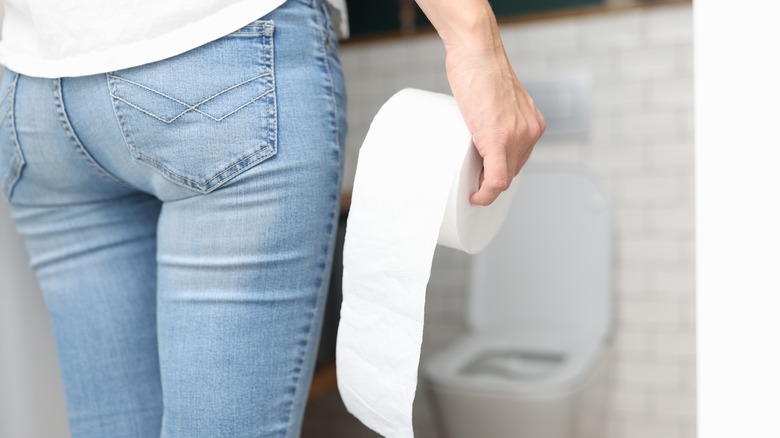Turns Out Men And Women Actually Poop Differently
With the advent of TikTok, we've been introduced to cute and funny ways in which men and women are different, like the simple challenge women can do but men can't. But even before social media existed, society was fascinated with the diversity between the sexes. Most times, it led to inequality, and other times, it led to celebrations.
Turns out, women and men are different from one another when it comes to their bowel movements too. And there are a few reasons for this. For starters, a woman's anatomy is not only different from a man's on the outside but also on the inside, and this can cause them to poop differently from men, according to a gastroenterologist at Georgetown Hospital, Dr. Robynne Chutkan (via Vox). Women have wider pelvises than their male counterparts and also more organs inside — think uterus and ovaries. This also means that women typically have a colon that's 10 centimeters longer and slightly lower than a man's.
The stool takes a longer and more challenging route through the digestive tract in women than men because of these physiological variations, according to the gastroenterologist. To make things worse (or better for the men), men's internal and external sphincter muscles are stronger, added a Utah-based gastroenterologist at Ogden Gastro, Dr. Chad Gonzales (via Pourri). This basically means their bowel movements are easier when compared with a woman's.
There are differences in the smell and texture of poop, too
You've probably already heard what the smell of your poop can tell you about your health. Turns out, women's poop could smell different to men's, mainly because of a different composition of gut bacteria that might be present in the digestive system of each of the sexes, shared assistant professor of gastroenterology at the University of Chicago, Dr. Edwin McDonald (via Pourri). "Due to this variation in the types of bacteria, the types of gasses produced may also vary between men and women, and, as we all know, some gasses smell worse than others," explained the professor.
A 2018 study published in The American Journal of Gastroenterology, which asked both men and women to report on their poop texture and consistency, found that women ranked themselves between a variation of 2–6 on the Bristol Stool Chart (a chart depicting seven types of poop based on shape and texture) and men ranked themselves between 3 and 5.
What this essentially means is that women reported having a wider variety of consistencies — from lumpy to mushy — while men said they experienced a fairly stable texture of solid poop. If you're a woman and you're having constipation, there's a reason for this too.
Women might be more prone to constipation and GI issues
Talk about getting the raw "end" of the deal (pun intended). According to a gastrointestinal specialist at Henry Ford Health, Dr. Susanne Shokoohi, women are two or three times more likely to feel plugged up than men when it comes to bowel movements. Blame this on the longer colon and other anatomical differences combined with hormonal fluctuations that happen during menstruation.
Women are also more at risk of developing other gastrointestinal issues like irritable bowel syndrome (IBS) and diarrhea. A study by the healthcare platform Amino found that certain health conditions affect men and women in different ways. Although the reasons in the study were not specified as having anything to do with anatomical differences, researchers found links for higher prevalence of conditions like gastroesophageal reflux disease (GERD), gallstones, IBS, ulcerative colitis, Chron's, and celiac disease in women than men (via Women's Health).
Some experts think that this might also be because women more often seek out healthcare providers when they notice something is off with their poop. "Men, in my opinion, are more likely to consider their stools normal, whereas women are more likely to talk with their doctors about gas, bloating and foul-smelling stool," explained Dr. Chad Gonzales to Pourri. Whatever the reason, it seems women have greater challenges when it comes to bowel movements and GI issues. But at least women have a longer lifespan than men!



